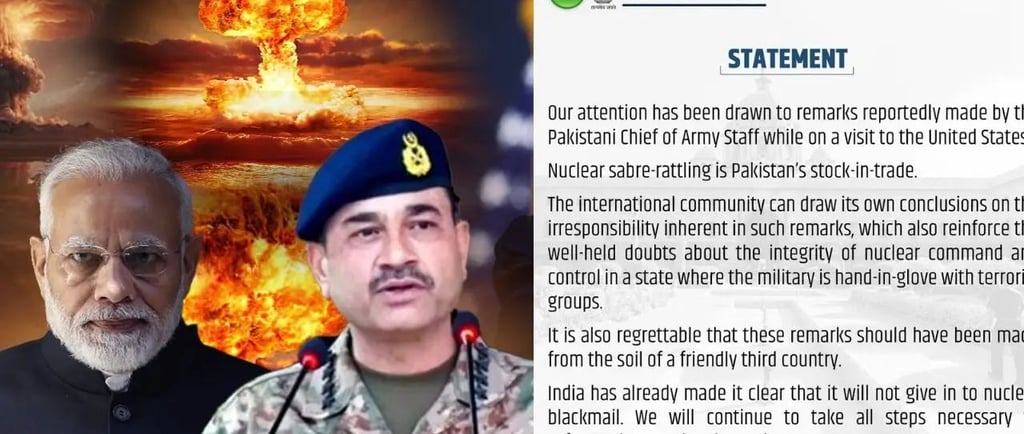India Strongly Rebukes Pakistani Army Chief’s Nuclear Threats Made in the US
8/12/2025


In a development that has once again highlighted the fragility of peace between India and Pakistan, New Delhi has issued a strongly worded rebuttal to recent remarks made by Pakistan’s Chief of Army Staff, General Asim Munir, during his visit to the United States. The statements, which involved open references to Pakistan’s nuclear weapons and threats directed at India, have drawn sharp criticism from India’s Ministry of External Affairs (MEA), which labelled the comments as yet another instance of Pakistan’s habitual “nuclear sabre-rattling.”
During a speech to Pakistani expatriates in Florida, General Munir made highly provocative claims. Declaring Pakistan to be a nuclear-armed nation, he went on to say that if anyone attempted to “drown” Pakistan, the country would “take half the world down with it.” This language left little ambiguity — it was a direct threat implying that Pakistan would not hesitate to use its nuclear arsenal in extreme circumstances. He also accused India of planning to build a dam on the Indus River that would affect Pakistan’s water supply, warning that if such a project went ahead, Pakistan would destroy it with a missile strike. These statements were not only inflammatory but also directly targeted at India’s sovereign infrastructure plans.
India’s Ministry of External Affairs quickly responded. In an official statement dated August 11, 2025, MEA spokesperson Randhir Jaiswal condemned the remarks in the strongest possible terms, saying that nuclear sabre-rattling is Pakistan’s “stock-in-trade” and that the international community can clearly see the irresponsibility in such statements. He noted that such rhetoric reinforces doubts about the integrity of nuclear command and control in a country where the military is aligned with terrorist organisations. The statement also indirectly addressed the United States, noting that it was regrettable that these comments had been made from the soil of a friendly third country. This was a clear diplomatic signal to Washington, suggesting that hosting such rhetoric could undermine regional stability.
India reiterated that it would not bow to nuclear blackmail and would continue to take all necessary measures to safeguard national security. This has long been India’s position — to remain firm, avoid engaging in nuclear brinkmanship, and focus on strengthening its defence and diplomatic capabilities. Pakistan’s repeated use of nuclear threats is not new. For decades, its leadership has invoked its nuclear capability during moments of tension, a tactic often dismissed as rhetorical posturing for domestic audiences. Yet, given Pakistan’s internal instability and the complex links between its military and militant groups, such threats carry serious risks.
By making such statements on American soil, General Munir may also have complicated Pakistan’s diplomatic standing with the US. While Washington has historically maintained a security relationship with Islamabad, tolerance for inflammatory rhetoric is wearing thin, especially as US–India ties have grown stronger. Munir’s reference to the Indus River touches on another sensitive issue — the long-standing water dispute between the two countries under the Indus Waters Treaty of 1960. The treaty, brokered by the World Bank, allocates control over the waters of the Indus River system between India and Pakistan. While the agreement has survived wars and decades of hostility, dam construction has repeatedly been a source of contention. India insists that its projects comply with the treaty, while Pakistan often frames them as threats to its water security. By threatening a missile strike over a dam, Munir escalated what is essentially a technical dispute into a military confrontation.
The timing and venue of Munir’s comments are also significant. Pakistan has been trying to strengthen defence and economic ties with the United States, and speaking to the diaspora in Florida was an opportunity for the army chief to project strength. However, this attempt to appeal to domestic and expatriate audiences has invited international criticism and scrutiny. For India, it underscores the need to remain alert and prepared. In the past, every major crisis between the two nations — from the Kargil War in 1999 to the Pulwama-Balakot episode in 2019 — has carried the shadow of nuclear escalation. While India’s approach has been measured, it has also focused on demonstrating that it will not be intimidated, whether through conventional military strength or diplomatic pressure.
In India, Munir’s statements have drawn strong reactions from political leaders, analysts, and defence experts. Many see them as evidence of Pakistan’s insecurity and its reliance on threats instead of genuine economic or political reforms. Experts have called for India to continue strengthening missile defence systems and intelligence networks while using diplomatic channels to expose the dangers of Pakistan’s nuclear posture. Within Pakistan, however, such threats often bolster the military’s position as the nation’s ultimate protector. The army wields enormous influence, often overshadowing civilian governments, and statements like these reinforce its central role. Yet this strategy carries international costs — further isolating Pakistan and raising concerns about its reliability as a responsible nuclear power.
Ultimately, this episode has again underlined the delicate state of India–Pakistan relations. While neither side seeks open war, mutual distrust and inflammatory rhetoric keep tensions high. India’s response has been to firmly reject the threats, call out their irresponsibility, and maintain that it will act decisively to protect its sovereignty. For Pakistan, the challenge lies in balancing domestic political narratives with the need to maintain credible diplomatic relations, particularly with countries like the US. Whether Munir’s remarks were intended as a rallying cry or as a genuine warning, they have intensified global scrutiny on Pakistan’s nuclear policy. The international community will be watching closely to see how both countries navigate this latest flare-up, knowing that in a region with nuclear-armed rivals, even a single miscalculated statement can have dangerous consequences.
